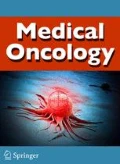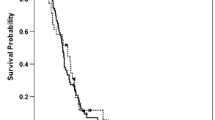Abstract
The study aims to investigate whether the glutathione S transferase P1 (GSTP1) and excision repair cross-complementing group 1 (ERCC1) polymorphism influence the response to treatment with platinum-based chemotherapy in Chinese patients with non-small cell lung cancer. Ninety-one patients with metastatic non-small lung cancer were evaluated. Blood samples were obtained from each patient before chemotherapy. They are all administered modified TP, GP, NP regimens. Curative effects in patients were evaluated after at least two cycles of treatment. TTP was calculated. The response rate of GSTP1 with G/G + G/A group and A/A group is 54.55 % (24/44) and 21.28 % (10/47) (P = 0.001), respectively. The response rate of ERCC1 with C/C group and C/T + T/T group is 51.11 % (23/45) and 23.91 % (11/46) (P = 0.007), respectively. Patients with both G/G + G/A and C/C has the response rate of 64.52 % (20/31) (P = 0.000). Logistic regression analysis shows a significant increased chance of treatment response in patients with G/G + G/A genotype versus A/A genotype (P = 0.008) and with T/T + C/T genotype versus C/C genotype (P = 0.001). The median TTP of all patients is 7.32 months. The TTP of individuals with G/G + G/A genotype is 9.56 months, and those with A/A genotype had an TTP of 5.23 months. The TTP of individuals with C/C genotype is 9.16 months, and those with T/T + C/T genotype is 5.53 months. Kaplan–Meier analysis shows that ERCC1 and GSTP1 polymorphisms are correlated with TTP. The log-rank test is was marginally significant (P < 0.01). GSTP1 and ERCC1 polymorphism are correlated with response to platinum-based chemotherapy and have prognostic value for TTP.


Similar content being viewed by others
References
American Cancer Society. Cancer facts and figures 2013. Atlanta, Ga, USA: American Cancer Society; 2013. http://www.cancer.org/acs/groups/content/@epidemiologysurveilance/documents/document/acspc-036845.pdf.
American Cancer Society. Non-small cell lung cancer; 2013. http://www.cancer.org/cancer/lungcancer-non-smallcell/index.
Mok TS, Wu Y-L, Thongprasert S, et al. Gefitinib or carboplatin–paclitaxel in pulmonary adenocarcinoma. N Engl J Med. 2009;361:947–57.
Dancey JE, Dobbin KK, Groshen S, et al. Guidelines for the development and incorporation of biomarker studies in early clinical trials of novel agents. Clin Cancer Res. 2010;16:1745–55.
Xu J, Yin Z, Shen H, et al. A genetic polymorphism in pre-miR-27a confers clinical outcome of non-small cell lung cancer in a Chinese population. PLoS One. 2013;8:e79135.
Okano Y, Nezu U, Enokida Y, et al. SNP (–617C>A) in ARE-like loci of the NRF2 gene: a new biomarker for prognosis of lung adenocarcinoma in Japanese non-smoking women. PLoS One. 2013;8:e73794.
Ding C, Li C, Wang H, Li B, Guo Z. A miR-SNP of the XPO5 gene is associated with advanced non-small-cell lung cancer. Onco Targets Ther. 2013;6:877.
Shitara M, Sasaki H, Yokota K, et al. Polymorphisms in intron 1 of the EGFR gene in non-small cell lung cancer patients. Exp Ther Med. 2012;4:785–9.
Jung M, Cho BC, Lee CH, et al. EGFR polymorphism as a predictor of clinical outcome in advanced lung cancer patients treated with EGFR-TKI. Yonsei Med J. 2012;53:1128–35.
Gonlugur U, Pinarbasi H, Gonlugur TE, Silig Y. The association between polymorphisms in glutathione S-transferase (GSTM1 and GSTT1) and lung cancer outcome. Cancer Invest. 2006;24:497–501.
Peklak-Scott C, Smitherman PK, Townsend AJ, Morrow CS. Role of glutathione S-transferase P1-1 in the cellular detoxification of cisplatin. Mol Cancer Ther. 2008;7:3247–55.
Medeiros R, Vasconcelos A, Costa S, et al. Metabolic susceptibility genes and prostate cancer risk in a southern European population: the role of glutathione S-transferases GSTM1, GSTM3, and GSTT1 genetic polymorphisms. Prostate. 2004;58:414–20.
Sekine I, Minna JD, Nishio K, Tamura T, Saijo N. A literature review of molecular markers predictive of clinical response to cytotoxic chemotherapy in patients with lung cancer. J Thorac Oncol. 2006;1:31–7.
Breen D, Barlési F. The place of excision repair cross complementation 1 (ERCC1) in surgically treated non-small cell lung cancer. Eur J Cardiothorac Surg. 2008;33:805–11.
Zhu C-Q, Ding K, Strumpf D, et al. Prognostic and predictive gene signature for adjuvant chemotherapy in resected non-small-cell lung cancer. J Clin Oncol. 2010;28:4417–24.
London SJ, Yuan J-M, Chung F-L, et al. Isothiocyanates, glutathione S-transferase M1 and T1 polymorphisms, and lung-cancer risk: a prospective study of men in Shanghai, China. Lancet. 2000;356:724–9.
Curran JE, Weinstein SR, Griffiths LR. Polymorphisms of glutathione S-transferase genes (GSTM1, GSTP1 and GSTT1) and breast cancer susceptibility. Cancer Lett. 2000;153:113–20.
Howells R, Holland T, Dhar K, et al. Glutathione S-transferase GSTM1 and GSTT1 genotypes in ovarian cancer: association with p53 expression and survival. Int J Gynecol Cancer. 2001;11:107–12.
Lizard-Nacol S, Coudert B, Colosetti P, Riedinger J-M, Fargeot P, Brunet-Lecomte P. Glutathione S-transferase M1 null genotype: lack of association with tumour characteristics and survival in advanced breast cancer. Breast Cancer Res. 1999;1:81.
Allan JM, Wild CP, Rollinson S, et al. Polymorphism in glutathione S-transferase P1 is associated with susceptibility to chemotherapy-induced leukemia. Proc Natl Acad Sci USA. 2001;98:11592–7.
Ada A, Hancer F, Bilgen S, et al. CYP and GST polymorphisms and survival in advanced non-small cell lung cancer patients. Neoplasma. 2010;57:512.
Kalikaki A, Kanaki M, Vassalou H, et al. DNA repair gene polymorphisms predict favorable clinical outcome in advanced non-small-cell lung cancer. Clin Lung Cancer. 2009;10:118–23.
Sun N, Sun X, Chen B, et al. MRP2 and GSTP1 polymorphisms and chemotherapy response in advanced non-small cell lung cancer. Cancer Chemother Pharmacol. 2010;65:437–46.
Xu C, Feng D, Li L, et al. The expression and prognostic significance of ERCC1 and GST-pi in lung cancer. Chin J Lung Cancer. 2010;13(3):195–200.
Zhou F, Yu Z, Jiang T, Lv H, Yao R, Liang J. Genetic polymorphisms of GSTP1 and XRCC1: prediction of clinical outcome of platinum-based chemotherapy in advanced non-small cell lung cancer (NSCLC) patients. Age. 2011;60:75.
Li X-D, Han J-C, Zhang Y-J, Li H-B, Wu X-Y. Common variations of DNA repair genes are associated with response to platinum-based chemotherapy in NSCLCs. Asian Pac J Cancer Prev. 2013;14:145–8.
Tepeli E, Caner V, Büyükpınarbaşılı N, et al. Expression of ERCC1 and its clinicopathological correlations in non-small cell lung cancer. Mol Biol Rep. 2012;39:335–41.
Zheng Z, Chen T, Li X, Haura E, Sharma A, Bepler G. DNA synthesis and repair genes RRM1 and ERCC1 in lung cancer. N Engl J Med. 2007;356:800–8.
Olaussen KA, Dunant A, Fouret P, et al. DNA repair by ERCC1 in non–small-cell lung cancer and cisplatin-based adjuvant chemotherapy. N Engl J Med. 2006;355:983–91.
Lord RV, Brabender J, Gandara D, et al. Low ERCC1 expression correlates with prolonged survival after cisplatin plus gemcitabine chemotherapy in non-small cell lung cancer. Clin Cancer Res. 2002;8:2286–91.
Roth JA, Carlson JJ. Prognostic role of ERCC1 in advanced non-small-cell lung cancer: a systematic review and meta-analysis. Clin Lung Cancer. 2011;12:393–401.
Cobo M, Isla D, Massuti B, et al. Customizing cisplatin based on quantitative excision repair cross-complementing 1 mRNA expression: a phase III trial in non-small-cell lung cancer. J Clin Oncol. 2007;25:2747–54.
Simon GR, Sharma S, Cantor A, Smith P, Bepler G. ERCC1 expression is a predictor of survival in resected patients with non-small cell lung cancer. CHEST J. 2005;127:978–83.
Choi C, Yang S, Jo H, et al. Proteins involved in DNA damage response pathways and survival of stage I non-small-cell lung cancer patients. Ann Oncol. 2012;23:2088–93.
Seyhan EC, Altın S, Çetinkaya E, et al. Prognostic significance of ERCC1 expression in resected non small cell lung carcinoma. Ann Thorac Cardiovasc Surg. 2011;17:110–7.
Olaussen KA, Dunant A, Fouret P, et al. DNA repair by ERCC1 in non-small-cell lung cancer and cisplatin-based adjuvant chemotherapy. N Engl J Med. 2006;355:983–91.
Tseden-Ish M, Choi YD, Cho HJ, et al. Disease-free survival of patients after surgical resection of non-small cell lung carcinoma and correlation with excision repair cross-complementation group 1 expression and genotype. Respirology. 2012;17:127–33.
Lee K-H, Min HS, Han S-W, et al. ERCC1 expression by immunohistochemistry and EGFR mutations in resected non-small cell lung cancer. Lung Cancer. 2008;60:401–7.
Vilmar AC, Santoni-Rugiu E, Sørensen J. ERCC1 and histopathology in advanced NSCLC patients randomized in a large multicenter phase III trial. Ann Oncol. 2010;21:1817–24.
Wang X, Zhao J, Yang L, et al. Positive expression of ERCC1 predicts a poorer platinum-based treatment outcome in Chinese patients with advanced non-small-cell lung cancer. Med Oncol. 2010;27:484–90.
Holm B, Mellemgaard A, Skov T, Skov BG. Different impact of excision repair cross-complementation group 1 on survival in male and female patients with inoperable non–small-cell lung cancer treated with carboplatin and gemcitabine. J Clin Oncol. 2009;27:4254–9.
Hubner RA, Riley RD, Billingham LJ, Popat S. Excision repair cross-complementation group 1 (ERCC1) status and lung cancer outcomes: a meta-analysis of published studies and recommendations. PLoS One. 2011;6:e25164.
Chen S, Zhang J, Wang R, Luo X, Chen H. The platinum-based treatments for advanced non-small cell lung cancer, is low/negative ERCC1 expression better than high/positive ERCC1 expression? A meta-analysis. Lung Cancer. 2010;70:63–70.
Reynolds C, Obasaju C, Schell MJ, et al. Randomized phase III trial of gemcitabine-based chemotherapy with in situ RRM1 and ERCC1 protein levels for response prediction in non–small-cell lung cancer. J Clin Oncol. 2009;27:5808–15.
Zhang S, Li Q, Zhang Q. Expression of ERCC1 and class III β-tubulin in resected non-small cell lung cancer and its correlation with platinum-based adjuvant chemotherapy. Int J Biol Markers. 2010;25:141–9.
Bepler G, Olaussen KA, Vataire A-L, et al. ERCC1 and RRM1 in the international adjuvant lung trial by automated quantitative in situ analysis. Am J Pathol. 2011;178:69–78.
Booton R, Ward T, Ashcroft L, Morris J, Heighway J, Thatcher N. ERCC1 mRNA expression is not associated with response and survival after platinum-based chemotherapy regimens in advanced non-small cell lung cancer. J Thorac Oncol. 2007;2:902–6.
Ota S, Ishii G, Goto K, et al. Immunohistochemical expression of BCRP and ERCC1 in biopsy specimen predicts survival in advanced non-small-cell lung cancer treated with cisplatin-based chemotherapy. Lung Cancer. 2009;64:98–104.
Friboulet L, Olaussen KA, Pignon J-P, et al. ERCC1 isoform expression and DNA repair in non-small-cell lung cancer. N Engl J Med. 2013;368:1101–10.
Vollebergh MA, Kappers I, Klomp HM, et al. Ligands of epidermal growth factor receptor and the insulin-like growth factor family as serum biomarkers for response to epidermal growth factor receptor inhibitors in patients with advanced non-small cell lung cancer. J Thorac Oncol. 2010;5:1939–48.
Zalcman G, Levallet G, Bergot E, et al. Evaluation of class III beta-tubulin (bTubIII) expression as a prognostic marker in patients with resectable non-small cell lung cancer (NSCLC) treated by perioperative chemotherapy (CT) in the phase III trial IFCT-0002. J Clin Oncol. 2009;27:7526.
Herbst R, Blumenschein G Jr, Kim E, et al. Sorafenib treatment efficacy and KRAS biomarker status in the biomarker-integrated approaches of targeted therapy for lung cancer elimination (BATTLE) trial. J Clin Oncol. 2010;28:7609.
Shepherd FA, Tsao M-S. Epidermal growth factor receptor biomarkers in non-small-cell lung cancer: a riddle, wrapped in a mystery, inside an enigma. J Clin Oncol. 2010;28:903–5.
Acknowledgments
This study was supported by Medical and health science and technology development plan called The molecular mechanism of DNA damage and repair capacity influenced by XRCC1-399 ERCC1-118 genetic polymorphism. The project number is 2011HZ028.
Conflict of interest
The authors report no conflict of interest in this work.
Author information
Authors and Affiliations
Corresponding author
Additional information
Hongying Lv and Ting Han have contributed equally to this work and should be considered co-first authors.
Rights and permissions
About this article
Cite this article
Lv, H., Han, T., Shi, X. et al. Genetic polymorphism of GSTP1 and ERCC1 correlated with response to platinum-based chemotherapy in non-small cell lung cancer. Med Oncol 31, 86 (2014). https://doi.org/10.1007/s12032-014-0086-5
Received:
Accepted:
Published:
DOI: https://doi.org/10.1007/s12032-014-0086-5




